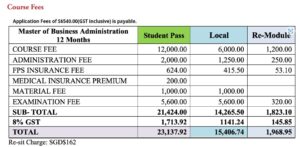
Introduction
The Master of Business Administration, or MBA, is the world’s most sought-after graduate management degree. The MBA equips students with fundamental business management knowledge across relevant fields like finance, accounting, and marketing, while developing essential soft skills and leadership skills.
What makes MBA courses so popular both in Singapore and worldwide is that upon completion of this master’s degree, students would be equipped with essential skills and professional networks that will benefit them throughout the course of their careers.
工商管理硕士,简称MBA,是全球最受追捧的研究生管理学位。MBA课程为学生提供了财务、会计、市场营销等相关领域的基本商业管理知识,同时培养了重要的软技能和领导能力。
MBA课程在新加坡和全球范围内的受欢迎程度在于,在完成这个硕士学位后,学生将具备必要的技能和职业网络,这些将在他们职业生涯的整个过程中对他们产生益处。
Course Structure and Synopsis
The course is designed to maximise students’ exposure to the real business world. Our excellent industry connections allow our students to have the opportunity to experience a range of additional workshops, and industry trips and visit. Students will have opportunities to participate in regional business and entrepreneurship competitions and visited local organisations. You will regularly hear from guest speakers who offer their insight and experience to add value to your classes. We also make use of these connections to help in assessments and you will work on live case studies and projects throughout your study.
Modules as below:
1)Managing Through Finance
This module provides an appreciation of a wide range of financial issues as they impact on the business world. It also evaluates the nature of the corporation and its governance from a financial perspective. It concentrates on the basic analysis of financial statements, financial tools and techniques before progressing to a more strategic perspective. It encourages students to see the financial implications of the decision-making process.
2)Project Management
This module equips participants with the analytical, practical, technical, and software skills necessary to manage business projects successfully. To this end, the module explores each stage of the project lifecycle model (initiation, planning, execution and closure) and examines the different skills required of the project manager at each stage.
3) Managing Strategic Change
This module aims to develop a critical understanding of organisational strategy, and to apply this to different contexts, including commercial and not-for-profit organisations of various sizes. It adopts an interdisciplinary approach to problem solving, drawing on skills developed in other modules. The content will cover contextual analysis, culture and stakeholder analysis, approaches to organisational change management, and methods of implementing and evaluating change interventions. The module encourages students to develop their own intellectual framework of values, attitudes and practice in relation to managing change.
4) Strategic Marketing
Marketing is fundamental to profitable business operations, achieved through strategic analysis, strategy formulation, strategic implementation and control. It is largely responsible for delivering core corporate objectives by offering value propositions to targeted customer segments, helping to sustain competitive advantage in the longer term. It is desirable for the contemporary MBA programme to contain a designated marketing module, which demonstrates a customer-facing approach, integrated across and throughout a business organisation. As a set of principles and practices, marketing also has relevance to public sector and other not-for-profit sectors.
5) Organisational Behaviour
This module introduces the study of organisations and their evolution. In particular it focuses on: Managing people; Managing technology; Managing responsibility. Rather than study each in isolation, in bringing together these key components of organisation strategy, this module reflects the reality of addressing the interests of multiple stakeholders simultaneously. Where appropriate, students are encouraged to reflect on the content of this module in their place of work.
6) Research Methods
The aim of this module is to introduce students to the wide variety of approaches and techniques of quantitative and qualitative research and to equip students with the skills required to collect, collate, analyse, present and interpret data. It also aims to provide a firm foundation for the dissertation. The content will cover the context of qualitative research, data collection techniques, qualitative data analysis techniques, statistical analysis or relationships and trends, sampling, and exploratory and descriptive research.
7) Consultancy Management
This innovative module will encourage the application and development of skills and knowledge to real time business problems through problem-based learning. Students will develop their ability to acquire, analyse and evaluate information, and to look for feasible solutions to business problems.
8) Dissertation
The dissertation provides students with an opportunity to undertake a substantial piece of independent research in an area of particular interest and to allow students to demonstrate their understanding of research methods and their application. It also provides an opportunity for students to relate their learning in taught modules to the analysis of a problem relevant to their Masters programme. On completion of the dissertation students will have designed an appropriate and feasible research plan, developed appropriate research instruments and written a dissertation of 15,000 words.
9) Exemptions to modules:
Candidates who possess relevant qualifications and work experience may be able to gain exemptions from modules subject to Academic Board approval in accordance with the University of Suffolk’s Recognition of Prior Learning Policy (RPL). The final decision of exemptions given by Academic Board on academic judgment is not appealable, however, we do allow appeals about RPL decisions on the basis of procedural irregularity or prejudice/bias. An exemption fees is payable upon applications. All students who attend the MBA in Singapore are students of the University of Suffolk, UK and will be accorded the same status as who study at the UK campus. Upon graduation, they will become an alumnus of the University of Suffolk. All certificates of awards and transcripts are issued by the University of Suffolk and are recognised globally.
Class Duration:
Class hours:
Teacher-Student ratio:
Admission Requirements:
- Minimum age: 23-year-old
- Hold a degree with a 2:2 minimum classification or equivalent from undergraduate degree in a relevant subject.
- or; a professional qualification of graduate status
- or; a Higher National Certificate (UK) or Higher National Diploma (UK) or equivalent at least 30 years of age with minimum 8 years of working experience (including three years management experience)
- or; at least 30 years of age with minimum 8 years of working experience (including 5 years of significant management experience)
English Language Proficiency:
- Minimum C6 in English Language at Singapore GCE ‘O’ Level or equivalent
- IELTS (Academic or UKVI): 6.5 overall, and a minimum of 5.5 in each component
- Pearson Test of English (PTE Academic): CEFR C1 Level
- University of Suffolk Password Skills Test: 6.5/7.0 overall, and a minimum of 5.5 in each component.
*Note: Non-native speakers of English will be given an English Proficiency test. Those who do not meet the required English standard will need to enroll for Standard English Course before apply for this course. Applicants whose English language level does not meet the minimum requirement can sit for an English Proficiency assessment to determine their English Language proficiency level.

About University of Suffolk Business School
University of Suffolk (uos.ac.uk)
The Suffolk Business School is a new and innovative community impact Business School. Based at the heart of one of the UK’s fastest city economies in Ipswich we are committed to developing the talent and entrepreneurial effectiveness of all learners across the University of Suffolk. At the heart of the Suffolk Business School is the Ipswich Waterfront Innovation Centre (IWIC), a dedicated space to bring together students, academics and businesses to drive forward change and innovation. Our connections with the world of business provides real, exciting and challenging learning opportunities for our students – developing their talent and supporting the business community to grow and innovate. Students enrolled within the Suffolk Business School benefit from a personalised learning experience which is designed to make you ‘career ready’. Our courses prepare you for the future you want. We nurture and demand the skills and capabilities that will build your confidence and will help you to navigate an ever-changing world of work.
UEN: 200308719M
